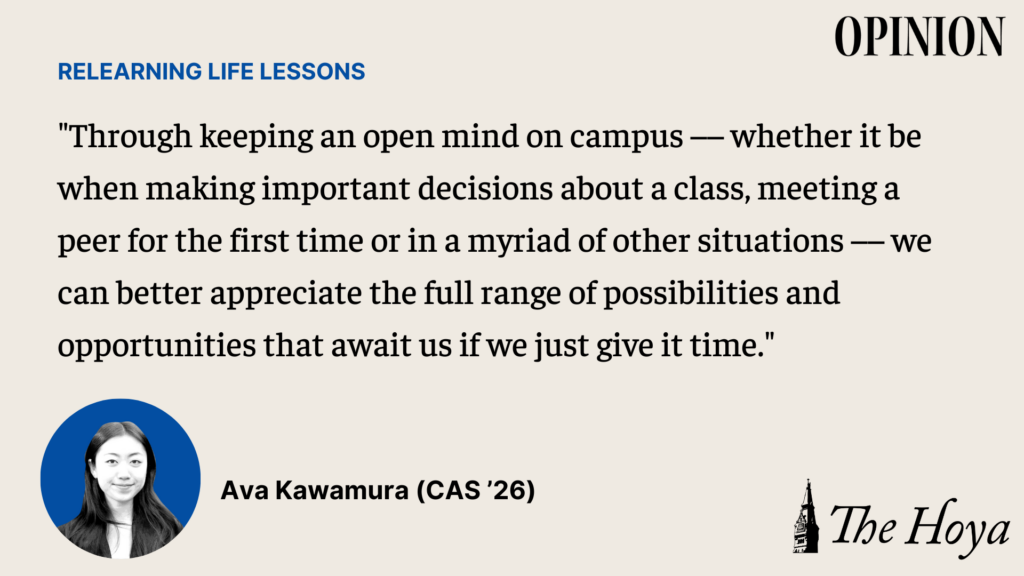The well-known phrase “don’t judge a book by its cover” implores people to avoid making quick assumptions based on appearances, especially before attempting to understand the bigger picture. When applying this lesson to Georgetown University’s campus life –– from academics to friendships –– I’ve found that having an open mind not only leads to more well-informed decisions, but can also lead to experiences that would not have happened otherwise.
Learning to rein in premature judgments can bolster our interactions with friends, professors and the Georgetown community through a rewarding mix of curiosity and understanding. Simply taking the time to converse with, ask about and learn from others will fundamentally enable us to look past our surface-level assumptions and uncover more meaningful relationships and opportunities.
I first noticed a tendency toward making hasty judgments on campus after course selection last semester, when I saw many of my friends use Rate My Professors, a popular website where students post reviews for professors after taking their courses, to make their class lists. When writing a review, Rate My Professors asks students for just a few pieces of information — course name, difficulty rating out of five, “overall quality” out of five and a short, 350-character review.
Reducing a professor’s teaching style and method to a limited description is restrictive in nature. While some reviews are helpful for understanding basic information about a course, such as textbook usage, lecturing style or amount of homework, the 350-character limit calls into question a student’s ability to comprehensively convey a professor’s character and serves as a breeding ground for premature judgments.
When one sees a particular buzzword –– whether it be “awesome” or “awful” –– and chooses to act immediately by enrolling in or removing that class, it perpetuates the danger of feeding into hasty assumptions. By boiling a professor’s teaching style down to such a short description, it strips them of their individuality and students of their potential to learn. A single review can miss critical details, such as an instructor’s communication style, real-life engagement level or willingness to reach out. For example, one student could choose to focus all 350 characters of their review on the difficulty of the course material and leave out the fact that a professor has flexible office hours or is incredibly kind.
Choosing a class shouldn’t hinge solely on a five-point rating, especially when the contexts behind those ratings remain unknown. It is infinitely more useful for students to take the time to speak with friends, former students and even professors themselves to learn more about course offerings.
I personally emailed several instructors last semester about their curricula and syllabi to better gauge their style. After feeling unsure about taking an upper-level, major-restricted course, I asked the professor about the class materials and readings, which he was more than happy to provide. The intriguing literature, compelling coursework and the instructor’s friendly communication prompted me to enroll, and it has since become one of my favorite courses this semester.
Rather than making quick judgments, this alternative opens up a path toward actual conversations and inquisitive dialogues that allow students to make a more informed decision about whether a class or professor is a good fit for them. And even if you come to the same conclusion as you would have by only using Rate My Professors, it is better to know that you have a full understanding of the situation rather than unknowingly passing up on an exciting opportunity to learn.
Premature assumptions can influence campus life beyond the classroom, too. And the ability to challenge these judgments can be just as rewarding in social situations. In my experience, being too quick to judge another person risks the possibility of losing –– or never recognizing –– a true friend.
My roommate and I often talk about what led us to agree to live together –– or, rather, how close we came to deciding not to. We come from the same city, and after texting for a while, we agreed to meet up. After several hours of awkward silences and short-lived conversations about our favorite music and hobbies, both of us were left unsure as to whether we really wanted to room together. However, we concluded that it was too early to judge after only meeting once, which reflected not only our willingness to look past our less-than-ideal first impressions, but also our capacity to learn more about each other before discarding our possible bond.
Our first-ever interaction was bound to be relatively awkward –– it’s inevitably difficult to connect with someone you met only a few hours prior, so first impressions can be deceiving when you don’t try to dig beneath the surface. It was only after moving in that we were able to realize the full potential of our friendship. What we thought of each other during our first interaction gave no insight into the laughter, activities and connection that we share now. All we needed was to take the time to understand one another and all our quirks, aspirations and shared interests to find the commonalities and values that connect us. After a few Leo’s dinners and movie nights after move-in, our conversations rarely ran short.
Taking all of this into consideration, the ability to recognize the faults in making premature judgments and the value of making an effort to understand the “bigger picture” can make room for greater understanding of ourselves and others. Through keeping an open mind on campus –– whether it be when making important decisions about a class, meeting a peer for the first time or in a myriad of other situations –– we can better appreciate the full range of possibilities and opportunities that await us if we just give it time.
Ava Kawamura is a first-year student in the College of Arts & Sciences. Relearning Life Lessons is published every third Friday.














